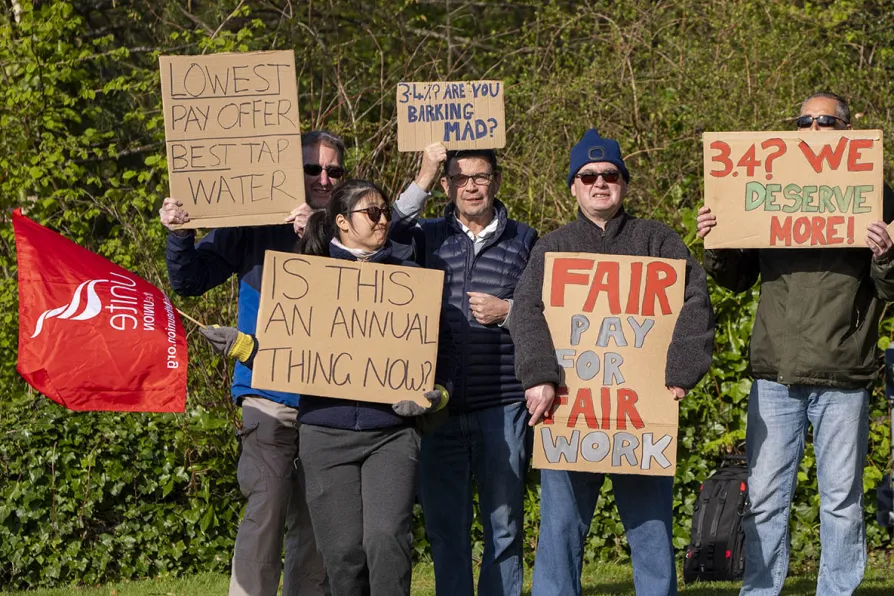
 Union members on the picket line outside Scottish Water's scientific services department at Juniper House in Edinburgh, as Scottish Water workers go on strike in a dispute over pay and grading, April 22, 2025
Union members on the picket line outside Scottish Water's scientific services department at Juniper House in Edinburgh, as Scottish Water workers go on strike in a dispute over pay and grading, April 22, 2025
AS EVER, there has been a steady theme running through this paper’s editorial comments over the past week.
Whether dealing with the lessons of Cable Street, the anti-semitic attack in Manchester, the Labour Party conference, Palestine or Chancellor Reeves’s forthcoming Budget, the conclusions generally point in the same direction: what Britain desperately needs is a revival of class politics.
What does this mean?
Perhaps we should begin with what it doesn’t mean. It doesn’t mean, for example, imagining the working class today as an overwhelmingly white, male, homogeneous body of full-time manual workers whose only concerns are their jobs, wages and working conditions.
A section of the political left still seems to act upon the basis of this myth, regarding all other issues as, at best, marginal and, at worst, diversionary when not downright divisive. Of course, most leftists in this category understand that this stereotype is a myth — but nonetheless it retains a powerfully romantic attraction.
So they sloganise endlessly about “revolution” and “the working class” many of them barely know in an effort to attract workers to the class struggle and socialism. Winning people who do not fit the stereotype is, naturally, to be scorned. Managers, supervisors, professionals, the self-employed, small business people, intellectuals, carers, and stay-at-home parents are not working class and so have no progressive role to play.
Feminists, LGBT people, greens and — dreadful elements — “liberals” are diversionary if not unwitting or conscious tools of the class enemy. Seeking alliances with them and any representative organisations they may have is a sure sign of class treachery.
At the other extreme, we have those who prioritise the needs and interests of sections of the working class and middle strata above the drive for unity against big business and the capitalist state, to the point of demonisation.
Thus, women who see the claims and demands of some trans campaigners as a threat to hard-won rights and facilities should be silenced and excluded wherever possible. People with concerns about the impact of immigration on their wages, services and communities are “Nazi scum” to be cleared off the streets.
Jewish citizens in Britain who fear for their safety should “stop whining” because Israel is slaughtering Palestinians in Gaza. Islamophobia is the bigger problem here at home.
Simple, isn’t it?
No, not really. There are complexities and contradictions to be addressed in each of these issues.
They all arise in a class-based society in which the interests of the wealthiest and most powerful class — the ruling capitalist class — are opposed to those of the working class (including working people and their dependants of all different colours, creeds, gender identities, etc.) and — not least in matters of war, peace and the future of our planet — of the rest of the population.
Class politics means challenging these basic, material ruling class interests at every level and on every front, especially in the workplace.
But as Marx and Engels once put it, “the ideas of the ruling class are in every epoch the ruling ideas” because this class owns or controls most of the means by which ideas are developed and transmitted throughout society.
Therefore, class politics must also include exposing ruling-class ideas on a mass scale in ways that are relevant, interesting and understandable.
None of this can be done by a single political party. Real and effective class politics requires a core of powerful mass working-class organisations.
Which is why extending, uniting and politicising the trade union movement is essential to beating back today’s right-wing political and ideological offensive and replacing Britain’s repressive, pro-big business and war-mongering government with one whose policies flow from a class-based analysis.










